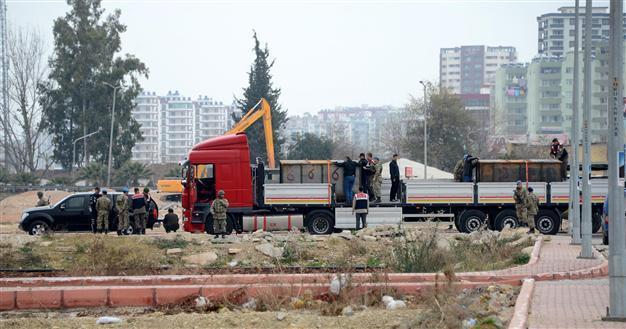Turkish main opposition says documents prove intel trucks were destined for al-Qaeda, ISIL
ANKARA

The trucks were stopped on Jan. 19, causing uproar as the government slammed the prosecutors and soldiers involved in the operation by arguing that both the truck and the personnel were protected by the legal immunity of the MİT. DHA Photo
A senior executive of the main opposition Republican People’s Party (CHP) has suggested there is documented evidence showing the trucks headed for the Syrian border were carrying weapons to aid Islamic militants.CHP Deputy Chair Bülent Tezcan, speaking at a press conference at Parliament on July 21, explained that Prosecutor Aziz Takçı, who was in charge of the investigating the trucks incident, had testified as part of another investigation.
Takçı has “an open declaration,” on the trucks issue within that testimony, Tezcan said. The partial search of the trucks was recorded in minutes related to the investigation, Tezcan said, while showing the records.
Takçı, who was at the time serving the Adana Court House, was sent to Trabzon after he initiated the investigation on the trucks that were stopped on Jan. 19, causing much uproar as the government slammed the prosecutors and soldiers involved in the operation, arguing both the truck and the personnel were protected by the National Security Organization’s (MİT) legal immunity. Responding to the claims, Interior Minister Efkan Ala said at the time the trucks were carrying aid to Turkmens in Syria, but did not give details about its cargo.
“What was found in the trucks is on official minutes. Images of all of these are also present. In each of the trucks, there are two big coffers made of sheet metal. Ammunition was being carried in them. In the first coffer in the first truck, 25-30 missiles and rockets, the lot numbers of which are written in Cyrillic alphabet. Impact fuses for missiles and rockets, with around 350-400 grenade launcher ammunition. In the second coffer, 20-25 missiles were designated. Mortar ammunition was found in 25-30 wooden coffers and antiaircraft ammunition in five or six sacks,” Tezcan listed.
“In the second truck; 90-100 cannon balls and packages with Arabic writing on them were found. In the third truck, they could barely conduct any search. The caliber and amount ammunition of which were not designated and were randomly put in that truck and found. Since it was not possible to count the ammunition under those conditions, they wanted to take it to the military garrison. However, it was interfered with and could not be taken in,” Tezcan added.
The CHP deputy referred to one of the truck driver’s testimony and said the trucks were loaded at Ankara’s Esenboğa Airport from a foreign-flagged plane and were destined for Reyhanlı. The trucks were taken to the border by drivers and were then taken from the border by MİT staff and handed over to either al-Qaeda or Islamic State of Iraq and the Levant (ISIL) militants.
On May 11, 2013, twin bombs killed 53 people in the border town of Reyhanlı in Hatay. Authorities have insisted the suspects being tried for the attack are linked to Syrian President Bashar al-Assad, not Islamist rebels, but several leaked documents have cast doubt on the government’s claims, suggesting al-Qaeda-linked groups committed the attack.
















